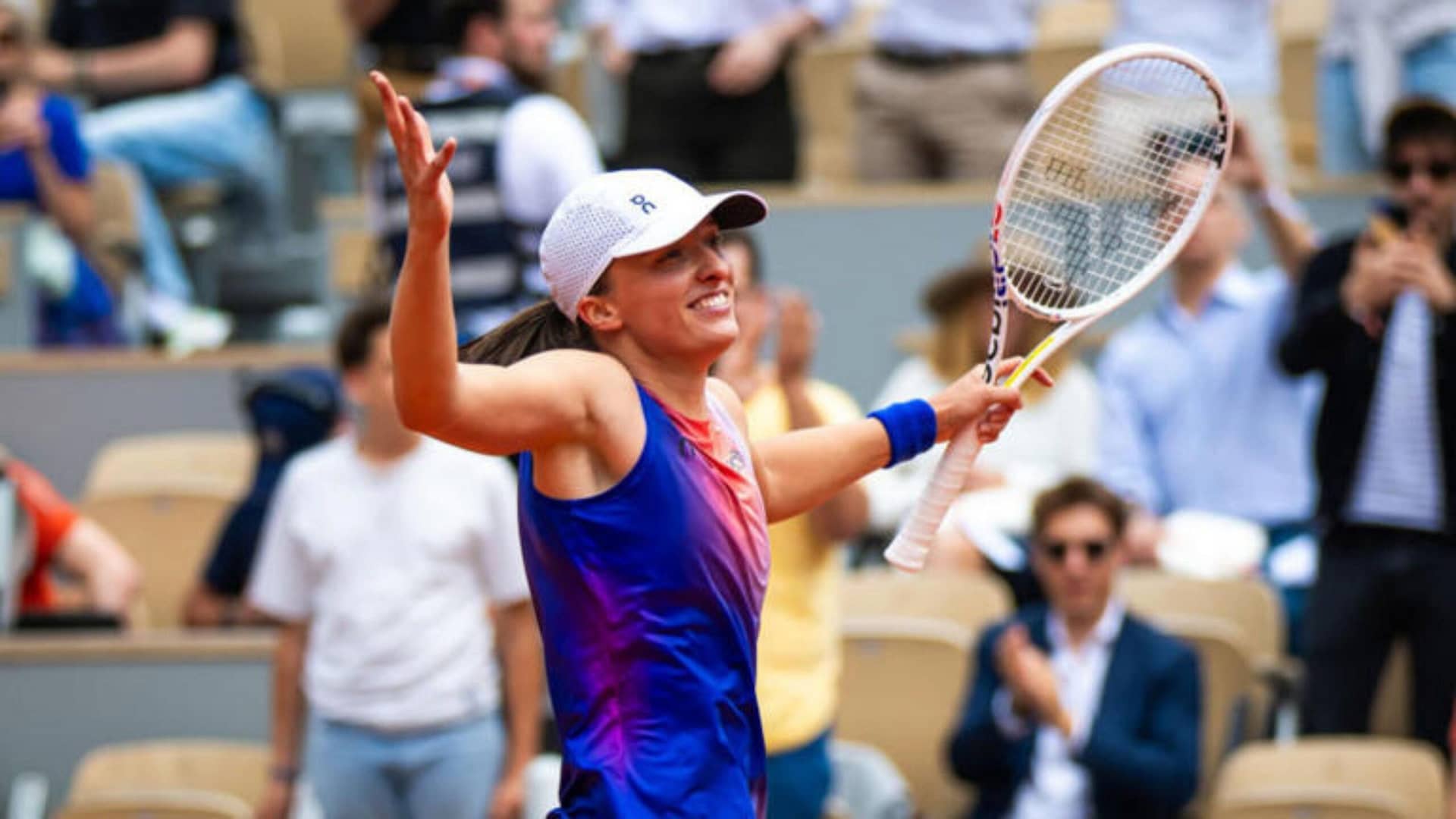The tennis world is still enthralled with Iga Swiatek’s reign at the French Open 2024. Her performances at the French Open have been extraordinary as she attempts to complete a historic three-peat.
Carlos Alcaraz, a male tennis player, has acknowledged Swiatek’s brilliance by naming her the greatest player in the world.
According to Alcaraz, “Iga is the best player in the world right now,” CBS Sports reported. “She’s become really good at tennis. “What she has done is simply amazing.”
Alcaraz’s commendation is highly significant. Swiatek is one of the most talented men’s tennis players, and his recognition of her abilities brings attention to her remarkable abilities and dependability on the court.
Swiatek is a powerful force in women’s tennis thanks to her remarkable accomplishments along the way to the top.
The top-ranked player in the world, Swiatek, has dominated women’s tennis in recent years. She is only 23 years old, but she has already accomplished incredible feats.
She became the first Polish player to win a Grand Slam singles title in 2020 when she won her first French Open championship. This marked the beginning of her ascent to fame.
Swiatek’s career has taken off ever then. Her 37-match winning streak in 2022—the longest WTA winning streak since Martina Hingis in 1997—was evidence of her brilliance and consistency.
Her dominance was cemented by these performances, which also brought her the WTA Player of the Year title for two years running—a feat last accomplished by Serena Williams.
Swiatek has had a combination of strong performances and resilience moments as she attempts to win the French Open for the third time in a row.
She faced Naomi Osaka in the second round of the French Open, which was a pivotal milestone in her current campaign. It was an intense struggle, and Swiatek almost missed an upset.
This close call seemed to light a flame in her, as she went on to put on one of her best performances to date, defeating Anastasia Potapova 6-0, 6-0 in just forty minutes, the shortest tour-level match of her career.
Swiatek’s supremacy has been on full display in her subsequent matches. She easily defeated Marketa Vondrousova in the quarterfinals, winning 6-0, 6-2.
She then squares off against American celebrity Coco Gauff in a much awaited semifinal match. This is a rematch of the French Open final from 2022, which Swiatek won handily 6-1, 6-3.
Swiatek is the obvious favorite given her current form, but Gauff’s skill and tenacity suggest an interesting competition.
Swiatek has received praise for her domination from peers as well as fans and commentators. Notable is Carlos Alcaraz’s declaration that Swiatek is the world’s greatest player.
Alcaraz acknowledges the greatness that Swiatek gives to the sport and appears on the cover of Top Spin 2K25 with Francis Tiafoe and Swiatek.
“Those two? Alcaraz referred to Roger Federer and Serena Williams as “legends.” “In sports in general as well as in tennis. They are idolized by many sportsmen, and it’s wonderful that they represent tennis.”
By contrasting Swiatek with these icons, one can see the difference she is making in the sport. Her current position is a result of her technical skill, mental tenacity, and capacity for high-level performance on a regular basis.
Future prospects for Swiatek in tennis seem promising. She has already accomplished at the age of 23 what many players can only hope for.
She doesn’t seem to be slowing down anytime soon based on her current form. She might follow in the footsteps of tennis greats like Serena Williams and Steffi Graf if she keeps going in this direction.
Swiatek’s supremacy at Roland Garros and her potential three-peat at the French Open are evidence of her tremendous talent, hard effort, and dedication.
She is not only guaranteeing her spot in tennis history but also serving as an inspiration to a new generation of players as she keeps up her success.
The narrative of Iga Swiatek’s rise to prominence in women’s tennis is one of skill meeting opportunity. She is the greatest player in the world, and Carlos Alcaraz rightfully believes so, considering her recent form and unwavering supremacy.
The tennis community will be keenly observing her as she advances in her career, curious to see what new heights she will scale.
Tennis players in the future will surely be motivated by Swiatek’s legacy, as her path serves as a potent reminder of the amazing potential in the game.
*This is an opinion based article by Priya Singhania, @09sports.com
- Jake Rogers’ Homers Spoil Venable’s Debut as Rangers’ Acting Manager in Tight 2-1 Defeat
- Dave Roberts Speaks Out After Los Angeles Dodgers’ 1-0 Loss to Pittsburgh Pirates
- MLB All-Star Weekend Reveals An Amazing New Skills Exhibition for the Future!
- Buoyant USA Upsets the 2022 World T20 Finalist Pakistan in Super Over
- Sparks’ Offensive Woes Continue in 86-62 Loss to Minnesota Lynx
